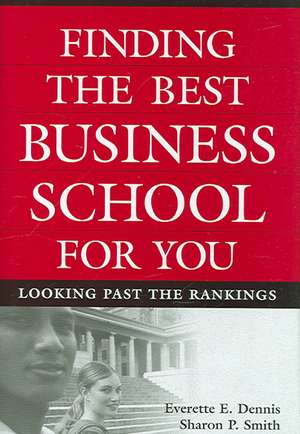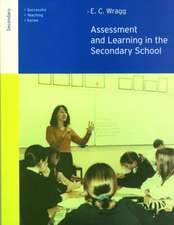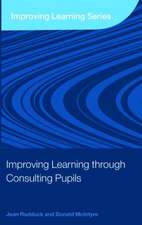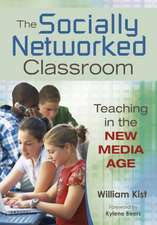Finding the Best Business School for You: Looking Past the Rankings
Autor Everette E. Dennis, Sharon P. Smithen Limba Engleză Hardback – 29 iun 2006 – vârsta până la 17 ani
Preț: 287.64 lei
Preț vechi: 349.69 lei
-18% Nou
Puncte Express: 431
Preț estimativ în valută:
55.04€ • 58.86$ • 45.89£
55.04€ • 58.86$ • 45.89£
Carte tipărită la comandă
Livrare economică 17 aprilie-01 mai
Preluare comenzi: 021 569.72.76
Specificații
ISBN-13: 9780275988203
ISBN-10: 0275988201
Pagini: 224
Dimensiuni: 156 x 235 x 25 mm
Greutate: 0.5 kg
Editura: Bloomsbury Publishing
Colecția Praeger
Locul publicării:New York, United States
ISBN-10: 0275988201
Pagini: 224
Dimensiuni: 156 x 235 x 25 mm
Greutate: 0.5 kg
Editura: Bloomsbury Publishing
Colecția Praeger
Locul publicării:New York, United States
Notă biografică
Everette E. Dennis is the Felix E. Larkin Distinguished Professor of Communication and Media Management at Fordham University, where he heads the Center for Communication. He is the author or editor of many books and articles on media and communications, higher education, and institution building, including Media Debates, Issues for the Digital Age, Higher Education in the Information Age, Demystifying Media Technology, and The Media at War, the textbook, Understanding Mass Communication, and Media Freedom and Accountability (coeditor, Greenwood, 1989). He has served as a member of the Council on Foreign Relations and on the editorial boards of Communication Law and Policy and the Journal of Religion and Media. He was the founding president of the American Academy in Berlin, founding executive director of the Media Studies Center at Columbia University, and a senior vice president of the Gannett/Freedom Forum Foundation.Sharon P. Smith is Provost and Vice President for Academic Affairs for National University and Vice Chancellor for Academic Affairs for the National University system. Prior to this appointment, she was Dean of the Faculty of Business, Dean of the Schools of Business Administration, and Professor of Management Systems at Fordham University. Author of two books and over two dozen articles and research reports on labor policy, management, and economics, she is a member of the board of governors of the National Association of Securities Dealers (NASD) and was a member of the board of the Security Traders Association Securities. Previously, she was a senior research economist at Princeton University, a senior economist for the Federal Reserve Bank of New York, a district manager with AT&T, and served as president of the NASDAQ Stock Market Education Foundation.
Cuprins
PrefaceChapter 1 The Appeal of the MBA-Warranted or Not?Chapter 2 Why an MBA, Anyway?Chapter 3 It Wasn't Always So-from Best Practices to Best StrategiesChapter 4 The Career-Resilient Learner and the MBAChapter 5 Quality Control-Grading MBA ProgramsChapter 6 The Rankings-Consumer Guidance or Magazine Mischief?Chapter 7 Using the Rankings and Thinking beyond ThemChapter 8 Understanding Return on Investment for the MBAChapter 9 Career Success and Personal SatisfactionChapter 10 A Portfolio for the FutureChapter 11 Criteria for the FutureChapter 12 Remembering that the "Real World" Is GlobalChapter 13 Finding the "Best" Business SchoolChapter 14 The New MBA-Enduring Ideas Meet InnovationNotesResource Guide to MBA ProgramsIndex
Recenzii
Dennis and Smith offer potential MBA students practical insights into selecting a master's-level business program and getting the most from their MBA experience. Given the enormous popularity of MBA education today, this book will be of special interest to professionals and aspiring managers/executives considering pursuing an MBA or specialized master's degree in business, as well as to faculty teaching in these programs. The book's 14 readable chapters explore the appeal of MBA degrees and whether or not this attraction is warranted; provide an inside look at the history, nature, scope, virtues, challenges, and failures of the MBA degree; and outline an approach that readers can utilize to evaluate the potential of various MBA programs to meet their professional and personal goals. Along the way, the authors explore the rise and problems of MBA ranking sources and their possible value and relevance to student selection decisions. The book closes by discussing how business schools are changing and will continue to evolve. All in all, an informative, thoughtful primer on the role of master's-level business education in today's world of commerce. Recommended. Public, academic, and professional library collections.
For prospective MBA students, Dennis and Smith detail how to choose a business school that is most suitable for them, based on their portfolio approach to MBA education, in which students design their own programs. They outline reasons to get an MBA, deconstruct school rankings, describe how to use them as just one source of information, and discuss how the concept of return on investment can be used to choose a school, as well as by gauging career success and personal satisfaction. They then examine important personal factors and the influence of globalization.
For prospective MBA students, Dennis and Smith detail how to choose a business school that is most suitable for them, based on their portfolio approach to MBA education, in which students design their own programs. They outline reasons to get an MBA, deconstruct school rankings, describe how to use them as just one source of information, and discuss how the concept of return on investment can be used to choose a school, as well as by gauging career success and personal satisfaction. They then examine important personal factors and the influence of globalization.













